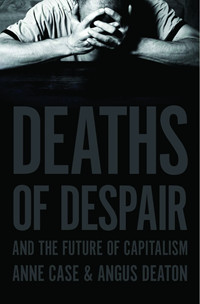Anne Case and Angus Deaton

Deaths of Despair and the
Future of Capitalism
Princeton University Press,
Princeton, NJ, 2020, 312 pp., $27.97
This book builds on Case and Deaton’s extraordinarily influential research on the mortality resulting from the tragic opioid epidemic in the United States, including suicides and alcoholic liver disease. The book is extraordinarily well written, sweeping yet succinct.
There is a brilliant tension that runs throughout the book between the boldface portion of the title, “Deaths of Despair” (a phrase Case and Deaton made famous), and the sweeping subtext of “and the Future of Capitalism.” To understand it fully, one has to appreciate that Case and Deaton’s studies have become a Rorschach test for journalists, opinion writers, and even many social scientists for what they believe ails America today.
Inequality, urbanization, globalization, the education divide, and the overpriced yet inadequate US health system have all been singularly blamed for the shocking rise in death rates, particularly among middle-aged white men and disproportionately in poorer rural communities that have been left behind.
The authors express sympathy for progressive perspectives on modern society and what might be done to improve it, but are cautious in pinning the blame. Looking at cross-state evidence, they show “poverty is not the source of the surge of deaths of despair.” While West Virginia and Kentucky are poor and have high overdose rates, Mississippi and Arkansas are also poor but do not have nearly as severe a problem. On the other hand, there are relatively rich states such as New Hampshire and Utah that have been severely impacted. New York City and San Francisco are ground zero for inequality, but have had less of an opioid problem.
Another popular culprit the authors take up is the global financial crisis. The timing would seem to make sense. Countries such as Greece had vastly deeper and longer recessions than the United States, however, and even during that country’s darkest hours, life expectancy continued to climb. The same was true in Spain and most of the rest of Europe. Despite these reservations about standard progressive explanations of ”deaths of despair,” Case and Deaton accept that in rural communities a loss of jobs and empowerment may have helped fuel the crisis.
The real villain in the book is the US health care system. The authors argue that hospitals, insurance companies, pharmaceutical companies, doctors, and device makers are all wildly overpaid by international standards, often because of the curious US tolerance for monopoly in recent decades. Case and Deaton offer an array of sensible solutions to foster lower prices and inclusion. Interestingly, however, they have no patience for those who see “Medicare for all” as a panacea. They emphasize that many countries have successful mixes of public and private care, that there is no one size fits all, and that transition effects need to be considered.
Simply put, this is a terrific book. I suspect it will be on many people’s top 10 book lists of 2020. Although written before COVID-19, the book’s critique of the US approach to health care and inequality is remarkably prescient. In many ways, the opioid crisis Case and Deaton analyze is a microcosm of the anguish the world is experiencing today, and we would be remiss not to pay attention to their insights.
Opinions expressed in articles and other materials are those of the authors; they do not necessarily reflect IMF policy.








